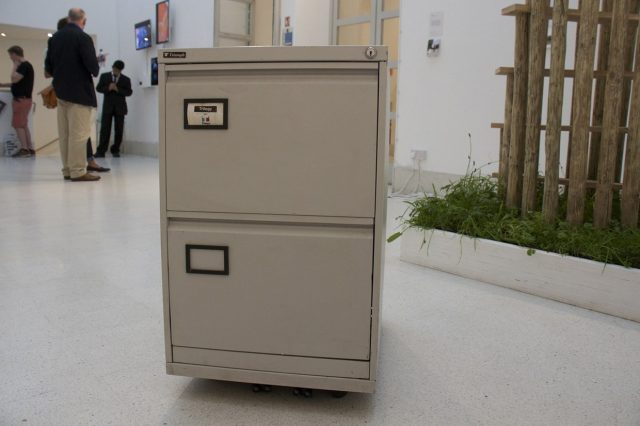
A filing cabinet is following people around the Royal College of Art to remind us our data is everywhere—and it will follow us everywhere.
I Know What You Did Last Summer is Jaap de Maat's final year project, the finale to a two-year-long MA in Information Experience Design. And anyone visiting the RCA this weekend will certainly get a dose of that design experience, as the clunky metal cabinet trundles towards them, stalking their every move.
"We hit some people, but that's just bruises," de Maat tells us. "Because it's funny, people just accept it." There's probably a whole other dissertation in this statement—our acceptance of pain in the face of hilarity. But for now de Maat's focus has been on themes of loss and the void. In the last chapter of his dissertation on these themes, Additive Subtraction, he debates online data storage. For so long, de Maat was fixated on the appearance of the digital world, as a graphic designer. But throughout his career he has grown preoccupied with what we can't see: "the spaces between the letters".
"Around the period I wrote it Snowden came out with his bombshell and I was quite shocked people mainly worried about the surveillance," de Maat tells us. "After more research I kind of wanted to make the point not so much people surveying us, but the fact it gets stored forever."
"I thought of the example of a lady that wanted to be teacher, but at the end of her course she didn't get a certificate because they'd Googled her and saw pictures of her drunk on the Internet. They said that was inappropriate for a teacher. People need to be aware of online storage."
Enter a trundly old pile of metal. Rescued from the confines of the office, it is now roaming around the RCA's halls, much to the delight of passersby. Inside the cabinet is an electric wheelchair that's had its wheels sawed off and replaced with superior alternatives. Then a motor and Arduino board were integrated, and distance sensors dotted around the cabinet ensure that (most of the time) it doesn't bump into anyone, thanks to some programming using
Max/MSP. A webcam watches the public's every move, and that data is sent wirelessly to the cabinet via a Bluetooth chip.
From the video embedded in this article, it seems the overarching response is that of sheer joy, with the public excited to be interacting with the seemingly ordinary object. "People are having a lot of fun playing with it," says de Maat. "They actually often treat it like a little dog—they stroke it and put food in front of it. They are quite happy and find it funny."
de Maat has already been invited to showcase it in Dubai, and he has been awarded studio space by the Barbican, so he can tweak the friendly inanimate piece of furniture. He plans on continuing to teach, largely at Central St Martin's, and from his dissertation it's clear de Maat is not done interrogating the vast issues he's touched upon here.
In it, he points to a history of knowledge inadvertently being repurposed as a disastrous weapon. He gives the example of Holland's 1930 census, constructed with good intentions to help run the country more efficiently. Instead, come 1940 it was used by the Nazis to more efficiently locate and remove the Jewish population and other unwanted minority groups.
We must not be complacent, he warns, pointing rather depressingly to the fact that in September 2013, when he penned the dissertation some three months after Edward Snowden expanded on his revelations in a YouTube video, it had just two million views. Depressing, because Miley Cyrus' Wrecking Ball video—as artistically relevant as it is...—spawned 100 million hits in five days. "The public is clearly not all that worried," writes de Maat.
He concludes the dissertation by warning that is neither practical nor possible to prevent the world from leaving its trace online. The Internet is not about to be switched off.
Instead, he has an interesting proposal, that he intends on exploring further.
"It might be possible to disguise one's tracks by bombarding your online history with a mass of random data, which would dilute your personal information and subvert the possibility of the automatic creation of a profile."
If that could somehow be facilitated by an autonomous piece of 80's furniture, all the better.
If you want to check out I Know What You Did Last Summer it will be showing at the RCA's Stevens building until 29 June.
reader comments
27